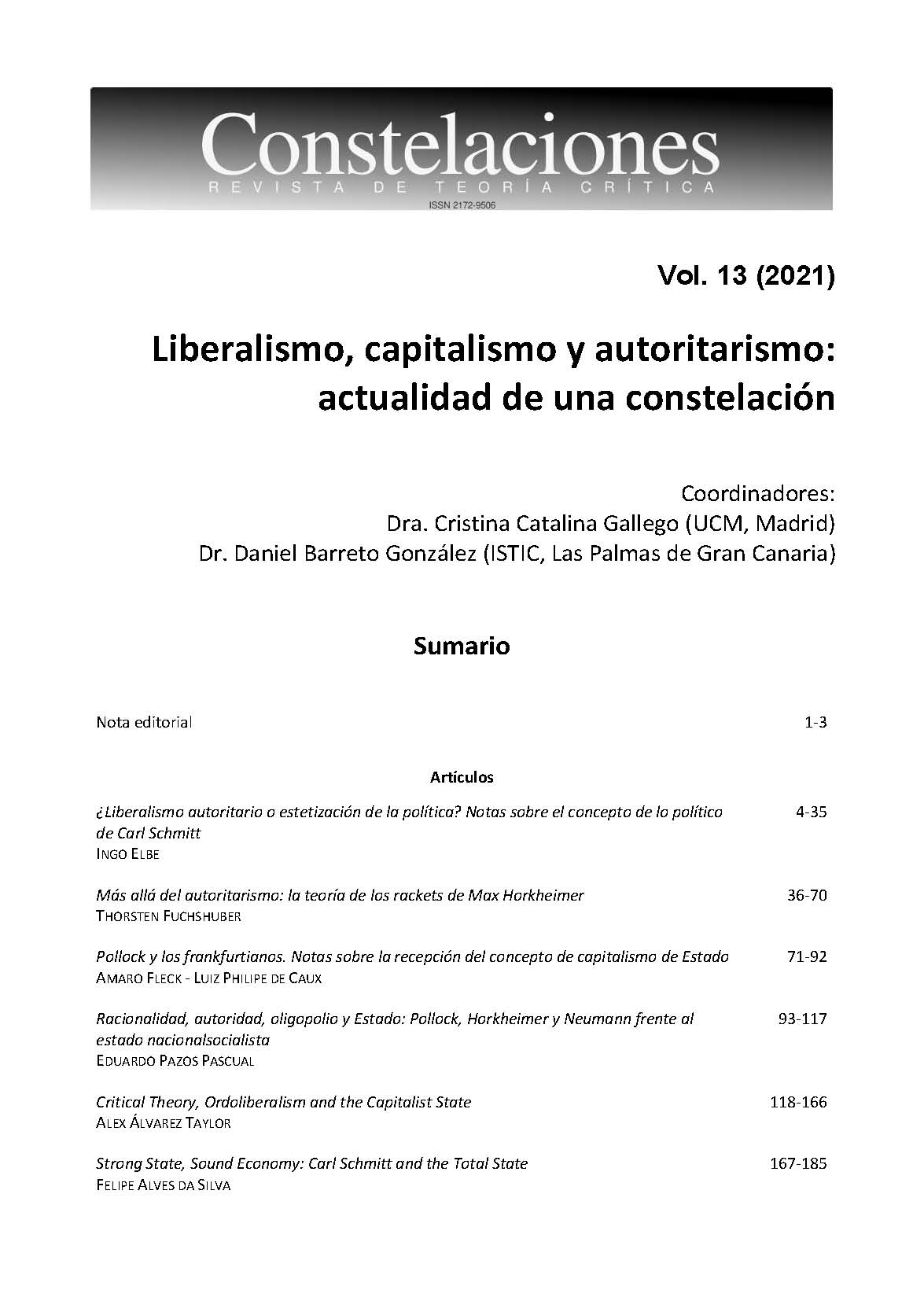Strong State, Sound Economy: Carl Schmitt and the Total State
Paraules clau:
totalitarian theory, liberal theory, fascismResum
Carl Schmitt’s concept of “total state” was formulated to describe the liberal state of the Weimar Republic that intervenes in all spheres of human life, overcoming the division between state and society. It is a total state by weakness since it is unable to curb social demands and to face the pluralism of interests of the political parties, which is followed by the subsequent bet on a real total state, called qualitative, thinking along the lines of the Italian fascist state: only a qualitative total state would be able to depoliticize society, overriding the interests of groups that seek to control the state, as a result, with non-intervention in the economy. Marcuse’s way to deal with this concept, using the term total-authoritarian state in reference to the qualitative total state, helps us comprehend the intimate relation between fascism and liberalism.
Descàrregues
Referències
BONEFELD, Werner (2016): Authoritarian Liberalism: from Schmitt via Ordoliberalism to the Euro, Critical Sociology, June 2016.
BONEFELD, Werner (2017a): Ordoliberalism and Political Theology: On the Government of Stateless Money. In: HIEN, J., JOERGES, C. (Eds.). Ordoliberalism, Law and the Rule of Economics, Portland, Hart Publishing.
BONEFELD, Werner (2017b): The Strong State and the Free Economy, London e New York, Rowman & Littlefield.
CHAMAYOU, Grégoire (2020): A sociedade ingovernável: uma genealogia do liberalismo autoritário, São Paulo, UBU.
CRISTI, Renato (1998): Carl Schmitt and Authoritarian Liberalism. Strong State, Free Economy, Cardiff, University of Wales Press.
HELLER, Hermann (2015): Authoritarian Liberalism? European Law Journal, v. 21, n. 3, may.
MARCUSE, Herbert (1965): Repressive Tolerance. In: WOLFF, Robert Paul; MOORE, Barrington; MARCUSE, Herbert. A Critique of Pure Tolerance, Boston, Beacon Press.
MARCUSE, Herbert (2009): The struggle against liberalism in the totalitarian view of the state. In: Negations, London, MayFlyBooks.
SAFATLE, Vladimir (2019): Dar corpo ao impossível: o sentido da dialética a partir de Theodor Adorno, Belo Horizonte, Autêntica.
SCHEUERMAN, William E. (1999): Carl Schmitt: the end of law, Maryland, Rowman & Littlefield.
SCHMITT, Carl (1940a): Die Wendung zum totalen Staat [1931]. In: Positionen und Begriffe im Kampf mit Weimar-Genf-Versailles (1923-1939), Hamburg, Hanseatische Verlagsanstalt Aktiengesellschaft.
SCHMITT, Carl (1940b): Weiterentwicklung des totalen Staats in Deutschland [1933]. In: Positionen und Begriffe im Kampf mit Weimar-Genf-Versailles (1923-1939), Hamburg, Hanseatische Verlagsanstalt Aktiengesellschaft.
SCHMITT, Carl (1979). Politische Theologie. Vier Kapitel zur Lehre von der Souveränität. Duncker & Humblot: Berlin.
SCHMITT, Carl (1985): Vorbemerkung. Über den Gegensatz von Parlamentarismus und Demokratie. In: Die geistesgeschichtliche Lage des heutigen Parlamentarismus, 6. Aufl., Berlin, Duncker und Humblot.
SCHMITT, Carl (1998): Strong state and sound economy: an address to business leaders. In: CRISTI, Renato, Carl Schmitt and Authoritarian Liberalism. Strong State, Free Economy, Cardiff, University of Wales Press.
VILLACAÑAS, José L. (2008): Poder y conflicto. Estudios sobre Carl Schmitt, Madrid, Biblioteca Nueva.
WOLIN, Richard (2006): The disoriented left: a critique of left schmittianism. In: The Frankfurt School Revisited: and other essays on politics and society, New York, Routledge.
Descàrregues
Publicades
Com citar
Número
Secció
Llicència
Drets d'autor (c) 2021 Felipe Alves da Silva

Aquesta obra està sota una llicència internacional Creative Commons Reconeixement-NoComercial-CompartirIgual 4.0.
Aquells autors que pugliquin en aquesta revista accepten els següents termes:
- Els autors conservaran els seus drets d'autor i garatiran a la revista el dret de primera publicació de la seva obra, la qual estarà simultàniament subjecte a la Llicència de reconeixement de Creative Commons que permet a tercers compartir l'obra sempre que s'indiqui la seva autoria i la seva primera publicació en aquesta revista.
- Els autors podran adoptar altres acords de llicància no exclussiva de distribució de la versió de l'obra publicada (p. ex.; depoditar-la en un arxiu telemàtic institucional o publicar-la en un volum monogràfic) sempre que s'indiqui la publicació inicial en aquesta revista.
- Es permet i es recomena als autors difondre la seva obra a través de Internet (p. ex.: en arxius telemàtics institucionals o en la seva pàgina web) abans i durant el procés de tramesa, la qual cosa pot produir intercanvis interessants i augmentar les cites de l'obra publicada.
Confidencialitat de les dades:
- Constelaciones. Revista de Teoría Crítica garanteix que les dades que ens trameti sols s'utilitzaràn per atendre les seves demandes manidestades en aquest missatge.
- Les seves dades no seran cedides a altra part.
- Quan ho desitgi pot solicitar que les seves dades siguin eliminades dels nostres registres.Teoría Crítica





